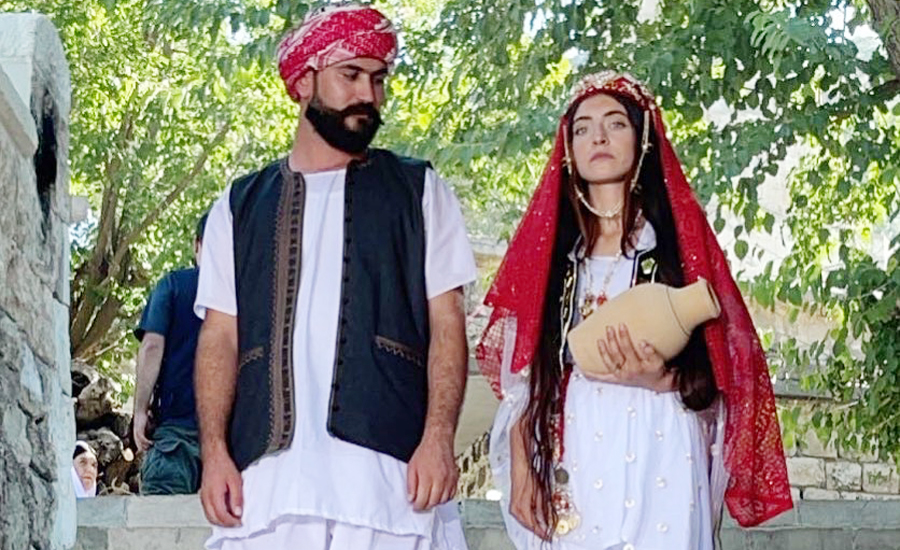A group of civil society activists and writers of the Ezidi ethno-religious minority in Iraq call on the Kurdistan Regional Government’s KRG ministry of education to ban the release of a video clip by Kurdish artist Rozhin for “disparagement of Lalish holy temple.”
Last week, the singer has finished filming the video clip in Lalish shrine located in Shekhan district of Ninewa plains. Photos of and short scenes of the video clip and behind the camera circulated on social media platforms have sparked wide protests.
Arshad Hamad Maho, expert of the history of Ezidis and professor in the University of Duhok, said “Lalish means silence and any visitor of the temple should keep silent and put off his shoes. How some one can dance there? Some of them were with shoes and improper dress and this is disregard for the sacredness of Lalish.”
Lalish is the most sacred place for the Ezidis all over the world where religious rituals are held.
“We are not against video clips about the Ezidis and even inside Lalish but this is not the right way. It was a mistake to allow recording video clips earlier and this should not happen again,” Maho angrily added.
“The scenes were painful for thousands of Ezidis. Lalish is not a studio for anyone who wants to record a clip. The people there won’t accept such a thing. Besides, the prince, Baba Sheikh and the spiritual council should not allow this,” Maho anguished.
Lalish is not a studio for anyone who wants to record a clip
Some Ezidis are posting photos and video scenes of the hit and criticizing its content.
The video clip shows a group of young Ezidi boys and girls dancing in religious attire. Some members of the crew are wearing shorts while the singer Rozhin is clapping and dancing.
Ezidism is an old Middle Eastern monotheistic ethnic religion and is based on belief in one God who created the world and entrusted it into the care of seven Holy Beings, known as Angels. The ouststanding among these angels is Melek Taus who is the leader and has authority over the world.
Most Ezidis speak Kurmanji, one of the two main Kurdish dialects. Most Ezidis consider Ezidism both a distinct ethnic and cultural identity and do not identify as Kurdish.
Shekhan and Shingal, located 120 km west of Mosul, center of Nineveh province, used to be home for over half a million Ezidis up to 2014, ahead of attacks by so-called Islamic State in Iraq and Levant ISIL.
Video: Part of the video clip by Rozhin from her account on Facebook social platform.
"It was a very big mistake and too bad. Anyone gave permission to shoot the video clip is accountable," Alyas Khatari, an Ezidi civic activist, said.
"Lalish is not a place for drum and trumpet; it's a place for worship. Our religion allows a special dance but such a video clip is a red line," he added.
KirkukNow has found no photos or videos showing dance in Lalish. Besides, the singer has got permission of the Ezidi leader Mir Thasin.
"Mir, the prince, has given them permission yet we had conditions and instructions for them," said Jawhar Ali Beg. "They have not followed the instructions so we will follow strict procedures against the supervisors of the video clip," said Ali beg without giving further details about the instructions they passed to the crew of the video clip.
"We call on the Kurdistan regional, KRG, ministry of culture to ban release and broadcasting the clip."
Video: Backstage of the video clip by Rozhin from Facebook social platform.
KirkukNow could not contact the singer or the clip crew. However, Rozhin said in a post on Facebook on June 19 that she respects the Eizidi religion and all its sanctities. "We produced a cool and successful hit to support our girls so thanks to all those cooperated including Mir Hazim Tahsin Beg and the servants in Lalish and Baba Chawish."
We produced a cool and successful hit to support our girls
"We have participated in the clip in a good will to show our culture and religion and we are not in charge of any trespasses," said Rana Sileman, trainer and manager of the Peace and Art chorography group.
The KRG has denied receiving any complaints against the clip.
Namiq Hawrami, director of media and relations at the ministry of culture said they have no idea about the debate. "No one has contacted us or filed a complaint to the ministry. If the Ezidis file a complaint, we will do a follow up by a committee."
"Once we conclude any misbehavior or defamation in the clip, for sure we will follow lawful procedures," he added.
The choreography group of peace and art plan to meet the Ezidi Prince.
"We will ask Mir to address the ministry and stop the video clip," Sileman said.
The video clip triggered protests to a level that filming in Lalish Shrine, the holiest temple for Ezidis whom are expected to make at least once a life six-day pilgrimage, will be banned forever.
"Now on, no artist or artistic groups will be allowed for video clip or any other artistic work inside Lalish," Ali Beg said.





